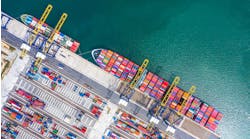CSCMP Edge 2019: If Geopolitical Chaos Has You Confused, Don’t Worry: There’s a 3PL for That
If it seems like you’ve been hearing about 3PLs (third-party logistics providers) forever, you’re not that far off. The term itself apparently emerged around about the time that the Motor Carrier Act of 1980 deregulated the trucking industry, which saw the number of trucking companies explode from roughly 20,000 to more than 1 million, with many of them offering very specialized services to a very small number of customers. The whole idea of outsourcing some aspect of logistics to a dedicated company that did nothing but move stuff or store stuff—letting your company focus on its core competency of making and developing stuff—caught on quickly, and today the 3PL industry is said to be worth over $200 billion in the United States alone, according to market research firm Armstrong & Associates.
These days, 3PLs will do just about anything you’re willing to pay them to do, although offering supply chain finance services might not be the first, or even the tenth, thing you think of that a 3PL might offer. That’s starting to change, though, based on research presented at the recent CSCMP Edge 2019 Conference in San Diego.
“Natural, political and operational disruptions are the new normal in today’s global supply chains,” explains Shanton Wilcox, head of North America Supply Chain, Infosys Consulting. “To mitigate these risks, companies are increasingly leveraging supply chain finance.” Wilcox was part of a panel discussion presenting results of the 2020 3PL Study, produced by Penn State University, Infosys Consulting and Penske Logistics.
The researchers looked at the impact of geopolitical volatility on shipper companies (primarily manufacturing companies), particularly in this current era of tariff changes and trade wars. Currently, 19% of shippers outsource the management of global political decisions on supply chain costs. Somewhat alarmingly, 20% of respondents say they’re not managing those decisions at all. The rest of the respondents are dealing with it internally, at least for now.
Supply chain financing, as the report describes it, “allows those within the supply chain to access capital that would otherwise be tied up while goods are in transit.” Due to the threat of tariffs and the potential of supply chain disruptions, companies are reacting by scheduling early imports ahead of tariffs deadlines, or in some cases holding more inventory. As a result, having access to somebody fluent in the language of supply chain finance—whether internally or via a 3PL—has emerged as a new best practice for shipper companies.
According to the survey, one-fourth of respondents (26%) now have a supply chain finance professional at the vice president level, with more than one-third (31%) having someone with the director title. The top supply chain finance costs for shippers are freight payment audit (72%), total landed cost (57%) and letters of credit (37%).
Another service that shippers didn’t even know they needed back when the 3PL Study was first launched in 1996 but is a top-of-mind concern today, is sustainability. As environmental regulations continue to hit supply chains from all sides (and not just in California), companies are finding that having a 3PL partner well versed in the nuances of alternative fuels, emissions tracking, route optimization and autonomous vehicles. As the report states, evaluating the entire supply chain network, including sourcing locations and product demand, can help a shipper reduce emissions while enhancing efficiency, and this is an area where shippers are coming to rely on 3PLs for their expertise.
The most popular greening initiative for shippers is in the area of optimization (e.g., route optimization, load consolidation), with more than eight out of 10 respondents (82%) using that technology in some way. While alternative fuels are currently only being used by 28% of respondents, within five years that number will jump to 43%.
As Joe Carlier, senior vice president of global sales, Penske Logistics, explains, “There are many benefits to a more sustainable supply chain. We have a responsibility to be better environmental stewards. A smarter and more agile supply chain is also cost effective.”
At the end of the day, though, the jury is still out as to just how effective the shipper-3PL relationship has become. In addition to shippers, the 3PL Study also polled 3PLs themselves for their insights, and there’s a bit of a disconnect between the buyers (shippers) and the sellers (3PLs). For instance, 93% of 3PLs believe they provide new and innovative ways to improve logistics effectiveness (I would’ve thought that number would’ve been 100%), but only 66% of shippers believe that’s true (or at least, they haven’t seen enough evidence of that from the 3PLs they’re working with). Similarly, 83% of the 3PLs believe that shippers are increasing their use of outsourced logistics services, but only 57% of shippers say that’s true. However, on the positive side, both shippers (93%) and 3PLs (99%) believe their relationships with each other generally have been successful. And as global supply chains become ever more complex in a more politically-charged world, no doubt we’ll see the emergence of even more services—particularly technologically-focused—from the 3PL community.




